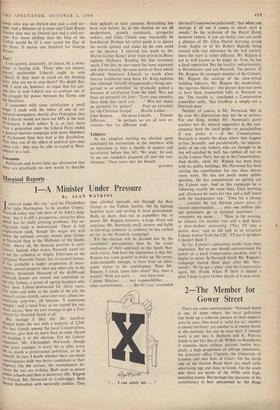Marginal Reports
1—A Minister Under Pressure
By ALAN WATKINS
Isnout]) judge this city,' said the Elizabethan Sir John Harrington, 'to be another Utopia.' Norwich today may fall short of Sir John's judg- ment: but it is still a prosperous, attractive place Which has no really piessing problems. The im- migration issue is non-existent. There is full employment (and, though the wages are well below the national average, money goes farther in Norwich than in the Midlands or the South- East). Above all, the housing position is sates' Iactory. Indeed, what makes Norwich stand out is not the cathedral or Anglia Television or the egregious Norwich Union, but its council houses. It has probably a higher proportion of muni- cipally owned property than any other city in the country. Seventeen thousand of the 40,000-odd Norwich houses are owned and controlled. by have city fathers, a group of ageing burghers who tlave been Labour-dominated for thirty years. For miles and miles to the south of the city the council estates stretch, some inter-war, others im- Mediately post-war, all hideous. 'I sometimes Wonder,' said local Tory as we toured the red- brick wastes, 'how we ever manage to get a Tory elected for Norwich South at all.'
But manage it they did. Mr. Geoffrey 11„IPPon holds the seat with a majority of 2,244. , best friends among the local Conservatives, however, give him no more than an even chance °I keeping it at the election. For his Labour °Pponent, Mr. Christopher Norwood, though bit years younger, is every bit as able, every ,°!t as much a professional politician, as he is himself. In fact, I doubt whether there are many constituencies with two better candidates at their disposal. On the surface, the resemblances be- tween the two are striking. Both went to minor Public schools and then to university (Mr. Rippon' t,° Oxford, Mr. Norwood to Cambridge). Both busied themselves with university politics. They
then climbed upwards, not through the Bow Group or the Fabian Society, but by lighting hopeless seats and serving in local government. Both, in short, deal not in pamphlets but in power. Mr. Rippon, however, is large, bland and cautious; Mr. Norwood small, intense and liable to left-wing outbursts (a tendency he has curbed so far in the Norwich campaign).
Yet the election will be decided less by the candidates' personalities than by the crude mechanics of their approach to the South Nor- wich voters. And here my impression is that Mr. Rippon has some ground to make up. He seems, understandably enough, to have been an infre- quent visitor to his constituency. Does Mr. Rippon, I asked, come here often? Say, once a month? 'Well, not quite . . . very busy man . . • Cabinet Minister . . . vast responsibilities . . . other commitments. . . . But let's say,' concluded
the local Conservative judiciously, 'that when you average it all out it comes to about once a
month.' In the seclusion of the Royal Hotel, however (where, if you are lucky, you can catch a glimpse of Dr. Glyn Daniel hurrying across from Anglia or of Sir Robert Bignold being treated with vast deference by the hall porter), there the story is rather different. Mr. Rippon is not as well known as he might be. True, he has a local reputation. But the locality, unfortunately, is Westminster and not .Norwich. The picture of Mr. Rippon the youngest member of the Cabinet, Mr. Rippon the scourge of the slow-witted building industry, Mr. Rippon the moderniser, the vigorous Minister : this picture does not seem to have been transmitted fully to Norwich as yet. 'The trouble is,' concluded a Conservative councillor sadly, 'that Geoffrey is simply not a Norwich man.'
Neither, of course, is Mr. Norwood. But in his case this deprivation may not be so serious. For one thing, neither Mr. Norwood's party workers nor his natural supporters in the con- stituency have the local pride—or parochialism if you prefer it — of the Conservatives. Norwich is merely the place where they happen to live. Secondly, and paradoxically, the unpopu- larity of the city fathers, who are thought to be too self-satisfied by half, has rubbed off not on to the Labour Party but on to the Conservatives. And thirdly, while Mr. Rippon has been busy with his public buildings, Mr. Norwood has been visiting the constituency for two days almost every week. He has not made many public speeches. He has concentrated on getting out the Labour vote. And in this campaign he is following exactly the same lines. Each morning and afternoon he tours for two and a half hours with the loudspeaker van: 'Time for a change . . . consider the last thirteen years—years of wasted opportunities . . . over one million old- age pensioners go to national assistance . . . remember my name . . .' Then, in the evening, he labours for another two and a half hours at door-to-door canvassing. (`Yes, I'll take a poster, dear,' said an old lady to an attractive Labour worker from the LSE. 'I'll put it up where it doesn't show.')
So far, Labour's canvassing results have been impressive. But no one should underestimate the power of a local Conservative machine once it begins to move. In Norwich South Mr. Rippon's campaign started three days after Mr. Nor- wood'. 'We've got a plan,' said the Conservative agent, Mr. Frank Atkin. If there is indeed a plan, I hope to give further details of it next week.














































 Previous page
Previous page